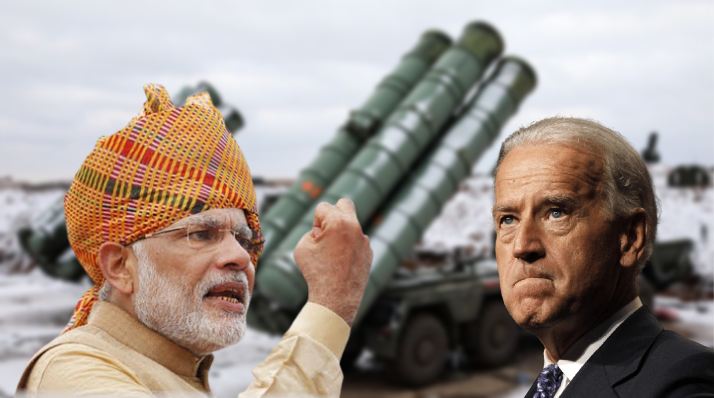The Biden administration keeps committing diplomatic blunders, and this time, it has committed a major blunder over the Indo-Russia S-400 deal. US officials and lawmakers have been continuously asking Biden to pursue a constructive relationship with India, instead of confrontation over the S-400 deal.
But an imprudent Biden tried to strong-arm India and ended up embarrassing himself on the world stage. Let’s explore how.
Biden administration played up the ‘CAATSA sanctions risk’
On Thursday, the Biden administration tried to bully India over the S-400 deal. India asserts that its decisions are essentially based on its national security concerns. However, US State Department spokesperson Ned Price said, “Well in many ways, this doesn’t change the concerns that we have with the S-400 system. I think it shines a spotlight on the destabilising role that Russia is playing not only in the region but potentially beyond as well.”
Read more: India signs S-400 air defense system deal with Russia
Had Price stopped here, it would have been alright. But he went a step further and issued the CAATSA threat. The spokesperson said, “When it comes to CAATSA sanctions, you’ve heard me say before, we haven’t made a determination with regard to this transaction, but it’s something we continue to discuss with the government of India given the risk of sanctions for this particular transaction under CAATSA.”
Speaking about the CAATSA sanctions, Price added, “I don’t have a timeline to offer, but these are issues that we continue to discuss with our partners in India.”
The Countering America’s Adversaries Through Sanctions Act (CAATSA) is a United States Federal Law that has imposed sanctions against Iran, Russia and North Korea. This act prevents trade partners of the United States from entering into bilateral contracts with these three nations.
India shoots down Biden administration’s CAATSA threats
There is a reason why officials and lawmakers were advising Biden to refrain from sanctions talk with India. After all, New Delhi is a pivotal power in the Indo-Pacific where the US faces a formidable challenge in the form of an assertive and authoritarian China.
But being the bully that he is, Biden couldn’t resist sanctions talk and set up himself for international embarrassment.
If Biden was thinking that the CAATSA threat will evoke a meek response from India, he was way off the mark.
The Ministry of External Affairs has declared that India pursues an independent foreign policy that also applies to its defence acquisitions and supplies. India also made it clear that it is guided by national security interests in such matters. The statement came a day after the US State Department talked about CAATSA sanctions risk.
MEA spokesperson Arindam Bagchi too made it clear that while India has a comprehensive global strategic partnership with the US, it shares a special and privileged strategic partnership with Moscow.
India will continue its defence partnership with Russia; Biden must accept a multi-polar world
At the end of the day, the fact remains that Russia is one of India’s most trusted friends and defence partners. While the Indo-US relationship is growing, India will never compromise its relationship with Russia.
And it shouldn’t matter to the US. Even if Biden has any problems with Putin in Ukraine and the rest of Eastern Europe, what does it have to do with the purchase of Russian defence equipment by India? And how is this “destabilising” the Indo-Pacific? After all, the Indo-Russia partnership is only marginalising China in the region and if the Biden administration has any problem with this, then it seriously needs to get its diplomatic priorities right.
In any case, India will keep expanding its defence partnership with Russia, even beyond the S-400 deal. India could be the first customer of Russia’s super-advanced and lethal S-500 Prometey surface-to-air missile defence system.
As for Biden’s S-400 concerns, India is not supposed to make him understand something that he presumably doesn’t want to understand. If Biden wants to act as a reasonable partner with India in the Indo-Pacific, it will be good for the US. Otherwise, the US will get edged out in a multi-polar world.
